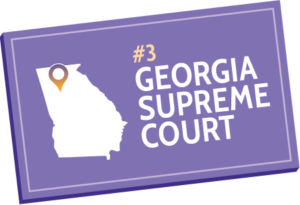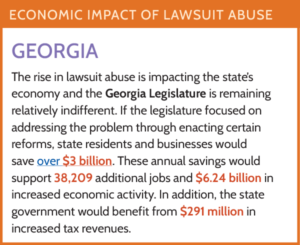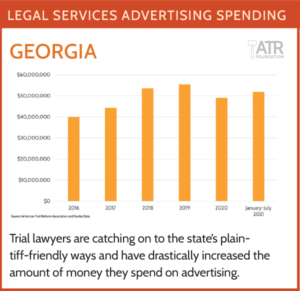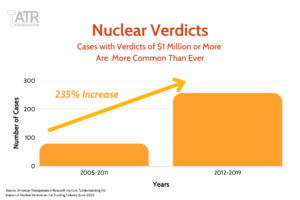OTHER LIABILITY-EXPANDING DECISIONS
Bad Faith
In April 2021, the Georgia Supreme Court lowered the bar for plaintiffs bringing bad faith claims against their insurers. In Geico Indemnity Co. v. Whiteside, the high court held that a defendant’s lack of notice of a lawsuit against a policyholder is no excuse for failing to settle a claim.
In this case, an individual was driving another person’s car, which was insured by GEICO, when she collided with a bicyclist. The bicyclist’s lawyer demanded the full $30,000 policy limit from GEICO and GEICO offered $12,409. The bicyclist’s attorney ignored this counteroffer and sued the driver. The driver failed to notify GEICO of the lawsuit, discarded the summons and complaint, and failed to appear in court. As a result, the bicyclist obtained a default judgment of $2,916,204 and forced the driver into involuntary bankruptcy. The bankruptcy trustee sued GEICO in federal court for negligently or in bad faith failing to settle the claim.
The jury determined that GEICO acted in bad faith when it failed to settle the bicyclist claim for $30,000 and that it was 70% liable (totaling more than $2.7 million with interest) for the default judgment.
GEICO appealed and the Eleventh Circuit certified questions to the Georgia Supreme Court including whether Georgia’s law relieves an insurer of liability in a bad faith suit when it had no notice of the underlying lawsuit against its insured.
The Georgia Supreme Court held that although the policyholder was required to provide notice to GEICO as a condition of receiving insurance coverage, GEICO “should have foreseen” that an unreliable, unsophisticated, and unstable driver would fail to do so.
While the court did acknowledge that this decision may be limited to the facts at hand, it opens the door for similar decisions in the future.
Employment Liability
Last year’s Judicial Hellholes® report highlighted Frett v. State Farm Employee Workers’ Compensation, in which the Georgia Supreme Court held that routine work breaks are incidental to work and, therefore, injuries suffered during that time are eligible for coverage. The ruling overturned the Court’s own 85-year- old precedent, which found that employee injuries suffered while off the clock are non-compensable.
Relying on last year’s Frett decision, the Georgia Court of Appeals found that a worker who suffered an injury during her lunch break is eligible for benefits under Georgia’s workers’ compensation law. The plaintiff was walking to her car during her lunch break when she tripped on a sidewalk in a company- owned lot. This ruling provides a glimpse into the future of workers’ compensation laws in the state, where employees can now seek coverage for non-work-related injuries suffered during scheduled breaks.
Registering To Do Business In Georgia Means Registering To Get Sued In Georgia Courts
In September 2021, the Georgia Supreme Court ruled that simply registering to do business in Georgia subjects an out-of-state business to lawsuits in Georgia’s state courts for all matters, regardless of the suit’s connection to Georgia. The state high court reached this result by adhering to its own three-decade-old decision that it acknowledged was “in tension” with a series of recent U.S. Supreme Court cases. Those
U.S. Supreme Court cases have generally found that due process does not permit state courts to assert jurisdiction over a business that is not located or headquartered in a state unless there is a sufficient connection between the business’s actions in that state and the lawsuit. Contrary to Georgia, several state and federal appellate courts have rejected a “consent by registration” approach to jurisdiction. The outcome in this case, Cooper Tire & Rubber Co. v. McCall, may discourage corporations from registering to do business in Georgia.
High Court Weighs In On Meaning Of “Sufficient Notice”
In Roberts v. Unison Behavioral Health, the Georgia Supreme Court lowered the bar for plaintiffs for pro- viding the State with sufficient notice of a claim, which is intended to facilitate settlement before a plaintiff files a lawsuit.
In that instance, a person involved in an accident with a van owned by a Georgia community service board sent the state a notice of the claim that lacked details describing her injury. Instead, the notice vaguely described the “nature of loss suffered” as “bodily injury; past, present and future mental and physical pain and suffering; infliction of emotional distress; past, present, and future medical expenses; past, present, and future lost earning; diminished earning capacity.” The notice stated that the amount of loss claimed for the unspecified injuries was $1 million.
The driver then filed a negligence action in state court. Although a Georgia trial court allowed the case to proceed, the Court of Appeals granted an interlocutory appeal and reversed, holding that the “description of the nature of her loss does not fulfill the requirement that she state the required information ‘to the extent of [her] knowledge and belief and as may be practicable under the circumstances.’” The Georgia Supreme Court, however, revived the lawsuit, finding that a plaintiff fulfills the notice requirement even if he or she simply parrots the statutory definition of loss without explaining the injuries involved.
As a result of the ruling, more Georgia taxpayer money is likely to go toward paying litigation expenses and judgments that could have been avoided through early, reasonable settlements.
 The significant deterioration of the Georgia civil justice system that took place in 2021 has propelled the “Peach State” to its highest-ever ranking on the Judicial Hellholes® list. The Georgia Supreme Court has developed a propensity to expand liability whenever given a chance and other courts around the state are following its lead.
The significant deterioration of the Georgia civil justice system that took place in 2021 has propelled the “Peach State” to its highest-ever ranking on the Judicial Hellholes® list. The Georgia Supreme Court has developed a propensity to expand liability whenever given a chance and other courts around the state are following its lead.







